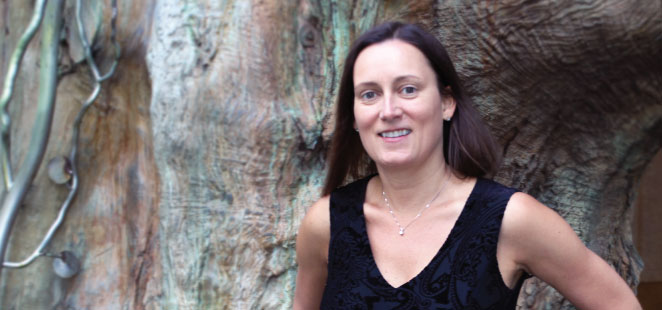Comfortable with the chaos

The song lyrics, “I will get by/I will survive,” are from the popular Grateful Dead tune, “Touch of Grey.” These words embody resilience as we age. For Moda Health Case Manager, Lisa Steeves, they are more than just lyrics; they are words to live by.
When Lisa was diagnosed with brain cancer as a 20-year-old sophomore at the University of Oregon, her prognosis was not good. At first, doctors said they couldn’t operate on the right side of her brain. As a left-handed person, the assumption was that she was right-brained dominant. If they operated, she would likely have a lifetime of disability, at best. But Lisa’s mother found a surgeon at UCSF willing to test her to see if she was one of about 20% of lefties who are left-brained dominant. Turns out, she was. This was good news.
Scared and apprehensive, it was a chance meeting with the surgeon at a brain tumor conference that gave Lisa the courage to have the surgery.
“As we are standing at the front desk at the Hilton Hotel, the same doctor walked up and said, ‘Hey, Lisa Mitchell, have you thought about letting me get in there and do my thing?’ He recognized me and remembered my first and last name. He said he could pretty much yank the thing out and I’d be pretty much myself. At that point, I was committed to having the surgery.”
Introduction to social work
Eager to get back to school following the successful brain surgery, Lisa had to undergo radiation and chemotherapy treatment. It was at the Willamette Valley Cancer Institute in Eugene, Ore. that she met social worker, Gretchen. Lisa said she liked Gretchen from the start. Her approach was much like her surgeon’s — “She treated my condition like it was no big deal. She made me feel normal.”
When Lisa’s treatment was complete, Gretchen said she needed to talk to her. She explained she had come across a cancer survivor’s scholarship in the newspaper and asked if she could apply for her. This is what first introduced Lisa to the social working side of healthcare, which is putting the resources together for someone.
After graduating with a degree in sociology, Lisa moved to Portland in 2000. Over the next few years, she held various social services positions. In order to make more money as a social worker, she realized she needed a master’s degree. In 2005, she earned her master’s in social work at Portland State before working the next five years as OHSU’s HIV Clinic Social Worker. After working as a care adviser with Propel Health, she joined Moda Health.
When it comes to working with Moda members, she said she takes a similar, realistic approach when talking to those diagnosed with an illness.
“When people are first diagnosed with things like HIV, diabetes or mental illness, it’s such a rude awakening, especially at a young age,” she said. “I remember how much it can throw your life off track. There’s so much stigma attached to their condition that people get really caught up in their worries.
“When they’re in the doctor’s office all they hear is, ‘you have to do this, you have to do that’; there’s no space for them to just grieve,” she added. “When I talk to members, I think it’s important to normalize and validate the experience. I try to help them understand that it’s okay to be upset. Yes, it’s tough and a drag and it’s going to change your life, but the key is get your education, get the medication, get all hooked up with the providers. Then, it’s important to be able to move on with life because their conditions are manageable.”
Grandfatherly advice
Looking back, she said when they were still meeting with different neurologists, her grandfather told her, “Until you know any different, just go on like you’re going to live to be a hundred.” She said his advice to keep living has never failed her.
“When I was first diagnosed, it was just about the same time that Lance Armstrong and Magic Johnson were dealing with their health issues,” she said. “My prognosis was bad. Brain cancer is kind of a heavy deal. Then I thought, these guys have these diseases and they are athletes. So, I thought I have to take really good care of myself. That was kind of it.”
Taking her grandfather’s advice to heart, Lisa became an avid runner. Although she ran on her high school cross-country team, a friend got her back into running as a young adult. She started running 5Ks to 10Ks before moving on to half-marathons.
“When I fell in love with running again, I felt so proud when I finished,” she said. “Believe me, I’m the most average marathon runner, but it’s great for stress and anxiety, and running has a zillion health benefits.”
To date, Lisa has completed five marathons and 12 half-marathons. It was also through a marathon-training group that she met her husband, Tyler, who is a nurse. They now have two boys.
Chaos coordinator
Each day, Lisa helps members manage their care. She enjoys how Moda combines medical health and behavioral health to give members access to important resources to manage their conditions. With members having so much to think about, Lisa uses those song lyrics as inspiration to help members manage their way through the complex healthcare system.
“It’s sort of accepting that life is a totally uncertain deal,” she said. “When everything is uncertain, you have to roll with the chaos. One of my former bosses once told me that I was comfortable with the chaos. I use that to help our members access resources to help them manage their conditions.”
Moda Health Months: Our personal health stories Read more personal health stories on our Moda Health Community page.

Hello.
We have exciting news to share. ODS is changing its name to Moda Health.
Moda comes from the latin term "modus" and means "a way". We picked it because that's what we are here to do: help our communities find a way to better health.
Together, we can be more, be better.
Please select the state you live in, or the state where your employer is headquartered, so we can tailor your experience:

Hello.
Please select the state you live in, or the state where your employer is headquartered, so we can tailor your experience:
Privacy notice
We use cookies and similar analytics technologies to understand how visitors interact with our website, improve performance, and enhance user experience. These tools help us analyze traffic patterns and usage trends.
We do not collect or store personal information, track users for advertising purposes, or use social media plugins.
By continuing to use this site, you acknowledge our use of cookies for analytics purposes only. For more information, please refer to our Privacy Policy.
Changing your location to Oregon
You can return to your previous location in the site header.
